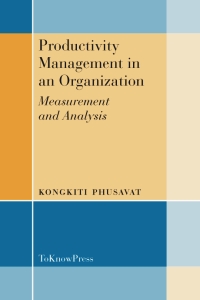 Kongkiti Phusavat
Kongkiti Phusavat
September 2013, 214 pp.
Open Access
ISBN 978-961-6914-05-5 PDF
Also available at EconPapers
Printed
ISBN 978-961-6914-04-8
30,00 EUR / 500 THB
Distributed by Kasetsart University
Productivity has survived for more than one century due to the recognition of its impacts on long-term business competitiveness. From a simple definition of output divided by input established in the late 1800s, productivity has continuously gathered a lot of interests from researchers and practitioners alike. Interestingly, productivity has been studied by several academic disciplines in business administration, economics, engineering, and psychology. Nowadays, being productive implies cost effectiveness and excellent performance.
Despite the changes and uncertainties in global business environment, productivity has continued to evolve. In fact, the focus on productivity has played the key role in the expansion of low-cost airlines and the emerging product design which emphasizes commonality and interoperability. The text highlights the issues relating to productivity measurement and analysis at the organizational levels. These issues include what to measure, where to measure, how to measure, and when to measure productivity/performance. The recent development in productivity measurement which uses the term value added as a surrogate for a firm’s output is also included.
